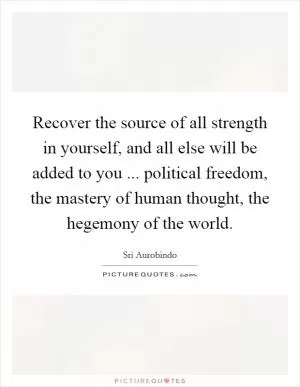Only the soul that is naked and unashamed, can be pure and innocent, even as Adam was in the primal garden of humanity

Only the soul that is naked and unashamed, can be pure and innocent, even as Adam was in the primal garden of humanity
Sri Aurobindo, a renowned Indian philosopher, yogi, and spiritual leader, believed in the concept of the evolution of consciousness and the ultimate goal of humanity to achieve a higher state of consciousness. In his teachings, he emphasized the importance of shedding the layers of ego and conditioning that separate us from our true essence, which he referred to as the soul.The quote "Only the soul that is naked and unashamed, can be pure and innocent, even as Adam was in the primal garden of humanity" reflects Aurobindo's belief in the purity and innocence of the soul when it is free from the constraints of societal norms and personal inhibitions. Just as Adam was unashamed of his nakedness in the Garden of Eden before the fall, Aurobindo suggests that true purity and innocence can only be achieved when one is completely open and vulnerable, without any pretense or facade.
For Aurobindo, the soul is the divine essence within each individual, the spark of the divine that connects us to the universal consciousness. However, this connection is often obscured by the layers of conditioning, ego, and desires that we accumulate throughout our lives. In order to access the purity and innocence of the soul, one must strip away these layers and return to a state of nakedness, both physically and metaphorically.
Aurobindo believed that through practices such as meditation, self-inquiry, and spiritual discipline, individuals could uncover their true selves and experience a profound transformation in consciousness. By letting go of attachment to the material world and embracing their inner divinity, individuals could attain a state of purity and innocence that mirrors the state of Adam in the primal garden.












 Friendship Quotes
Friendship Quotes Love Quotes
Love Quotes Life Quotes
Life Quotes Funny Quotes
Funny Quotes Motivational Quotes
Motivational Quotes Inspirational Quotes
Inspirational Quotes